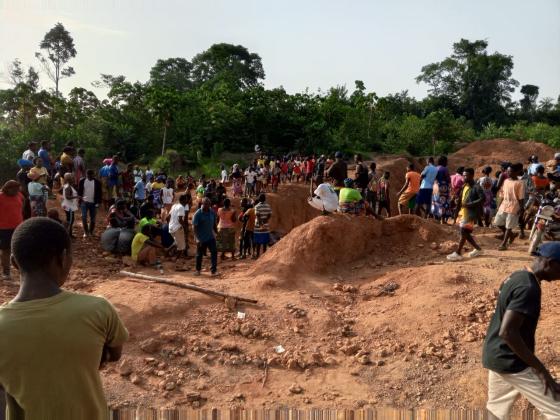At Least 10 Die in River Cess Mining Accident

By Aaron Geezay and Alberto Dixon, Special for The DayLight
CHEO TOWN, River Cess – At least 10 miners died after a mining pit they were digging collapsed in a town in River Cess County.
Their bodies after they were recovered from the pit, pictures and videos of the accident taken by the local media show.
The incident occurred between Cheo Town and Charlie Town along the Yarpah Town and Cestos highway.
The victims, townsmen from the region, were on a gold rush at the open goldmine previously run by the Development of African Commodities (DEVACO).
Isaiah Ziah 18, an eyewitness, said there were over 10 people in the pit. Ziah had just left the pit when the disaster struck.
“I left and carried my gravel bag before it happened,” he said.
The victims are both from Cheo and Charlie Towns where the gold mine is situated. Some of them have been identified as Tardeh Chapay, Richard Baryogar, Edwin Dennis, Alfred Dehdyu and Paul Zah.
Cooper Barney, a liaison officer of the Ministry of Internal Affairs, said he had earlier advised the miners to leave but they did not listen.
“I even told them the Police Support Unit (PSU) was coming but they said ‘When the PSU come, we will stone them [off],’” Barney said. He added that the miners told him to “‘go and lie down.’” The DayLight could not independently verify those claims.
DEVACO was awarded a medium-scale license in July 2021 and will expire in 2026, official records show. However, the company had abandoned the site for several months, according to locals.
This mining accident adds to a list of several in the last five years.
In 2020, two miners were killed in Grand Cape Mount County.
That same year, four miners were also killed in a mine collapse in Jacksonville, Bong County.
Earlier in 2019, 40 miners were buried alive in Nimba County, the worst mining accident since the No Way Camp disaster in 1982.
This story was originally published by The DayLight and has been republished here as part of a collaboration.
Funding for the story was provided by the United States Embassy in Monrovia. The DayLight maintained editorial independence over its content.
